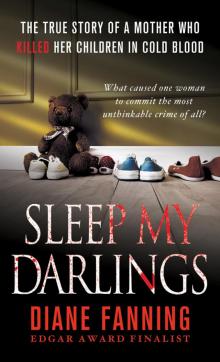- Home
- Diane Fanning
Baby Be Mine
Baby Be Mine Read online
Dear Reader:
The book you are about to read is the latest bestseller from the St. Martin’s True Crime Library, the imprint The New York Times calls “the leader in true crime!” Each month, we offer you a fascinating account of the latest, most sensational crime that has captured the national attention. St. Martin’s is the publisher of bestselling true crime author and crime journalist Kieran Crowley, who explores the dark, deadly links between a prominent Manhattan surgeon and the disappearance of his wife fifteen years earlier in THE SURGEON’S WIFE. Suzy Spencer’s BREAKING POINT guides readers through the tortuous twists and turns in the case of Andrea Yates, the Houston mother who drowned her five young children in the family’s bathtub. In Edgar Award-nominated DARK DREAMS, legendary FBI profiler Roy Hazelwood and bestselling crime author Stephen G. Michaud shine light on the inner workings of America’s most violent and depraved murderers. In the book you now hold, BABY BE MINE, Edgar Award nominee Diane Fanning tells the tragic tale of the murder of a pregnant Missouri woman . . . allegedly by a woman who wanted her baby.
St. Martin’s True Crime Library gives you the stories behind the headlines. Our authors take you right to the scene of the crime and into the minds of the most notorious murderers to show you what really makes them tick. St. Martin’s True Crime Library paperbacks are better than the most terrifying thriller, because it’s all true! The next time you want a crackling good read, make sure it’s got the St. Martin’s True Crime Library logo on the spine—you’ll be up all night!
Charles E. Spicer, Jr.
Executive Editor, St. Martin’s True Crime Library
St. Martin’s True Crime Library Titles
by Diane Fanning
Gone Forever
Through the Window
Into the Water
Written in Blood
BABY BE MINE
The Shocking True Story of a Woman Accused
of Murdering a Pregnant Woman to Steal Her Child
DIANE FANNING
NOTE: If you purchased this book without a cover you should be aware that this book is stolen property. It was reported as “unsold and destroyed” to the publisher, and neither the author nor the publisher has received any payment for this “stripped book.”
BABY BE MINE
Copyright © 2006 by Diane Fanning.
Cover photo of Lisa Montgomery courtesy AP/Wide World Photos. Photo of Bobbie Jo Stinnett by Zuma/courtesy of Nodaway-Holt High School.
All rights reserved. No part of this book may be used or reproduced in any manner whatsoever without written permission except in the case of brief quotations embodied in critical articles or reviews. For information address St. Martin’s Press, 175 Fifth Avenue, New York, NY 10016.
ISBN: 0-312-93873-X
EAN: 9780312-93873-4
Printed in the United States of America
St. Martin’s Paperbacks edition / September 2006
St. Martin’s Paperbacks are published by St. Martin’s Press, 175 Fifth Avenue, New York, NY 10010.
10 9 8 7 6 5 4 3 2 1
This book is dedicated to the memory of Bobbie Jo Stinnett
And to the beautiful daughter she left behind.
Acknowledgments
It is hard to know where to begin when you have so many people to thank. So, I’ll just start at the point where my research began—the St. Joseph Police Department—thanks to Chief Mike Hirter, Commander Larry Smith, Sergeant Mike Wilson and Sergeant Curtis Howard, and to retired St. Joseph’s Police Chief Lloyd Pasley.
Thanks to Nodaway County Sheriff Ben Espey for his time and for the determined commitment he brought to Bobbie Jo Stinnett’s case, and to Detective Randy Strong of the Maryville Public Safety Department, Sergeant Dave Merrill of the Missouri Highway Patrol and Osage County Sheriff Laurie Dunn.
No true crime writer can ever express enough appreciation to the folks who work in district and circuit court clerks’ offices in counties coast to coast. Their help is of immeasurable value. This time around, I owe a debt of gratitude to Curtis Quick of Calloway County, Vicki Mills of Franklin County, Rita Stevens of Atchison County and the staff in the court clerks’ offices in Osage County, Boone County and Nodaway County.
I also need to thank the folks in the office of U.S. Representative Sam Graves for their assistance and acknowledge the Court TV Crime Files for background on Ken McElroy. Thanks, too, to Lydia Tederick, Assistant Curator at the White House and Don Ledford in the public affairs division of the Office of the United States Attorney for the Western District of Missouri.
In Kansas, I want to express my appreciation to Isabel Phelon, Kathy Dewey and Judy Shaughnessy. To Darrell Schultze—thanks for sharing the warmth of your wood stove and your personality on a cold November evening. In Missouri, a big thank you to Becky Harper, Cheryl Huston, Carla Wetzel, Mary Rose Wiederholtz, psychic Joyce Morgan, Chuck Ellis and Will and Donna Mae Schneider. In both states, thanks to all the folks who shared their thoughts and memories but requested anonymity.
In the world of rat terrier aficionados, I must point out the great people I met there: Jason Dawson, Dyanne Siktar and Pat Kennedy.
I extend very special, heartfelt thanks to Northwest Missouri native Teri McCarthy of McCarthy Print in Austin and to all the gang at PPSD for helping me to make important connections. And to Lysa M. Nistico, John Pinter, and Jennifer Steves—thanks for your help.
To Cathy Nahirny, John Rabun and Stephanie Rodriquez at the National Center for Missing and Exploited Children, thank you for your input and assistance. To the three of you and to all of the dedicated people of your organization, thank you for all the hard work you do for children and families. Because of your efforts, the world is a better place.
As always, there are a few people I need to thank with every book I write: my peerless agent Jane Dystel, St. Martin’s Press executive editor, Charlie Spicer, and my ever-patient editor Joe Cleemann. And finally, the priceless support of my first reader, best friend and life partner, Wayne.
1
Chris Law looked out the window of his home onto Elm Street, a quiet neighborhood in the small rundown town of Skidmore in the northwest corner of Missouri. Most of the houses on that dead end street cried out for a fresh coat of paint or the immediate attention of a carpenter or roofer. They huddled together tired and neglected—sagging beneath the weight of a cold December day. The bare branches of the trees and the winter weariness of the lawns added to the bleakness of the block.
Chris peered catty-corner across the street to the little white bungalow with flaking paint that Zeb and Bobbie Jo Stinnett called home. They were a cute couple—friendly but quiet. Bobbie Jo, though, had a sparkle in her eye that revealed an ornery sense of humor beneath her gentle, still demeanor.
The young couple in their early twenties were newlyweds—their marriage less than two years old. They were already expecting their first child—the due date was January 19. The coming of the baby created a growing excitement for their tomorrows. They saved every penny they could to build a nest egg and make it possible to own their own home. They envisioned a life for their baby that exceeded the expectations they had for their own.
Now just nine days before Christmas, Bobbie Jo had reached that awkward, waddling stage. She rolled up the sidewalk more than she walked. She had to hold on to a secure object when she bent down to pick something up off the floor.
Chris had planned to walk over and pay a visit to Bobbie Jo that afternoon. He wanted to ask her about her recent prenatal test results. In a town this small, everyone focused on each expectant mother. With the population shrinking, any birth was big news.
He hesitated when he spotted a dirty, pinkish-red two-door import parked the wrong way in front of her house. He thought he ought not to bo
ther Bobbie Jo, since she had company. He popped his head up to the window a couple of times to see if the coast was clear so he could slip over without interrupting her social visit.
It seemed to him as if the car was there for hours. But he could have been wrong. Waiting for a change of events over which he had no control did make time crawl slower than the sand in a clogged hourglass.
Sometime well before 3:30, he decided he would catch up with Bobbie Jo later. He jumped in his car to drive the fourteen miles up State Road V to Maryville to run a few errands. His town had no grocery store, pharmacy, fast food restaurants or even a Wal-Mart.
As he hit the end of Elm Street, he had second thoughts—maybe he should stop in and check on Bobbie Jo anyway. What if something was wrong? He pulled out on the main road and circled around a block as he toyed with the idea. Ultimately, he decided not to yield to his sudden flash of paranoia. He’d be a good neighbor and not disrupt her visit with her guests. He headed on up the road.
Once Chris left home, no one was watching 410 Elm Street. Bobbie Jo was alone with her mystery visitor. The rat terriers she bred out of her huge love of animals and passion for the breed—and for a small profit—were put up in their room. No neighbor looked as the front door jerked all the way open. Not a soul saw the dirty-blond woman with the frenzied eyes and furtive moves walk across the front porch. No one took note of the blanketed bundle cradled in her arms. No one watched as she scurried to her car, pulling the bundle closer to her chest as if sheltering it from the wind and the cold. No one heard the unmistakable cry of a newborn infant No eyes followed the dirty red car with Kansas plates as it made a rough U-turn at the dead end of Elm Street and drove off to parts unknown.
A short while later, Becky Harper turned onto Elm Street. She passed the big yellow house with its toy-laden porch and splotchy lawn. She drove beyond a sad, sagging home with a weedy front yard. She turned around at the dead end and pulled in front of her daughter Bobbie Jo’s home. It was 3:30 in the afternoon.
The front door to the tiny bungalow was ajar. A tingle of concern sent ripples across her scalp. Folks in Northwest Missouri simply did not leave their doors open to the cold of December. Even nice sunny days bore too much chill in the air.
Becky pushed the door all the way open, hollering, “Bobbie Jo! Bobbie Jo!”
There was no response. A tight band of apprehension tugged in her chest. Bobbie Jo was eight months pregnant. Had she gone into early labor? Was she sick—too sick to respond? Becky hesitated with each step she took into the house.
Stepping inside the home, she saw nothing to cause alarm. Everything was neat and orderly in the living room. She moved to the dining room and the kitchen. Everything was in its place. Even this late in her pregnancy, Bobbie Jo maintained the tidy appearance of her modest home. Becky called out to her daughter again and was greeted by frustrated barks from Bobbie Jo’s dogs. Becky moved past the kitchen and toward the animals confined in the small bedroom Bobbie Jo transformed into a room for her dogs. Barks and whimpers emerged from the metal kennel cages lining the room. Against one wall, an old dresser served as a grooming station for her rat terriers.
As she reached the doorway, a vision out of a slaughterhouse exploded before Becky’s eyes. Blood. Pools of blood. Garish red smears streaked and swirled on the oak floor boards. Huge, dark clots of blood scattered on the surface like trampled roses in mud.
Becky saw the body on the floor, but in her heart she wanted to believe all this carnage was from one of the dogs. Whatever horrible thing happened to any one of them would break Bobbie Jo’s heart. She could deny the reality before her dazed eyes for brief seconds only. There at her feet lay her only daughter—the mother of her soon-to-be first grandchild—and she was covered in blood. The young woman who, twenty-three short years ago, was only a small warm burden inside of Becky’s body now lay still on the floor.
Splotches of blood covered Bobbie Jo’s face. Streaks of ruby red ran up and down her arms. Her belly, distended from pregnancy, splayed open to reveal protruding internal organs scorched with a screaming crimson. Even the small soles of Bobbie Jo’s feet glistened with blood.
Becky’s eyes saw the truth of the horror. Her mind ran from it. Her eyes had to be lying. She tried to deny the truth of her senses and failed. Still, the scene made no sense to her. She struggled to frame it into a coherent possibility. “My daughter’s intestines exploded,” she said when she called 9-1-1.
As soon as the words passed her lips, she was no longer certain of their reliability. Her world tilted and wobbled on an unreliable axis. She was undone.
The operator asked, “Is she still-breathing?”
“I don’t know,” Becky wailed. She kneeled in the blood beside her oldest child’s side struggling to numb the paralyzing emotions that siezed her own limbs. She followed instructions as the operator talked her step-by-step through the administration of cardio-pulmonary resuscitation.
She tilted back Bobbie Jo’s head and pinched her nose. She covered her daughter’s mouth with her own and delivered the sharpest breath she could. She rose up and placed her hands on Bobbie Jo’s chest and pushed down. One time. Two times. Thirty times.
In less than twenty seconds she was back on her daughter’s mouth with two more breaths. Then back to the chest compressions again. Over and over. Breathing and pushing. Counting the compressions aloud to block the noise of her own dreadful thoughts and keep her focus.
She choked. She sobbed. But she did not stop.
Four-term Nodaway County Sheriff Ben Espey was in the dispatch center in Maryville when Becky’s frantic call shattered the peace of a quiet afternoon. He jumped in his truck and floored the pedal—making the half-hour drive in fourteen minutes. He was the first responder on the scene.
Becky turned to him with crazed yet determined eyes and pleaded, “I need help with this.” CPR was so simple but so exhausting.
Espey got down on the floor to assist. He smelled the slight musky undertone of dog present even in this clean, well-kept kennel. Blaring above that scent was the iron-rich scream of freshly-shed blood. He saw no signs of life in the body of the young woman on the floor, but did not whisper his fears to the mother. He just worked with Becky as a team while distressed dogs whimpered their mournful fears.
On the east end of Elm Street, Carla Wetzel heard the howl of the sirens. She could not see where the vehicles stopped. But it was just past the time school let out and she worried that a school bus had wrecked.
Across the street from the Stinnett home, Tracy Grossoehme played in the yard with her two small children, enjoying the relative balminess of that winter afternoon. They stopped what they were doing as the ambulance pulled into their street, staring open-mouthed.
As it parked in front of their neighbor’s home, Tracy’s oldest child asked, “Can we say a prayer for the hurt person?”
“Yes, we can,” Tracy said.
Three heads bowed in a moment of silence, marking the first public prayer sent to the heavens for Bobbie Jo and her baby. It certainly would not be the last.
Five minutes after Espey’s arrival, the paramedics flew out of the ambulance and into the house, where they relieved Becky and the sheriff of their hopeless duty. The emergency medical pair checked for vital signs and found no indication of life. Just the same, they attempted to revive Bobbie Jo, continuing the performance of CPR her mother started, but they, too, failed to get a response. It was far too late.
Espey told the paramedics that Bobbie Jo was eight months pregnant. He then listened in disbelief as one of the emergency medical technicians pointed to the cut umbilical cord and informed him, “This lady has been murdered because someone came to get the child out of her body.”
It didn’t seem possible. Espey struggled to wrap his mind around the crime. How could anyone attack a pregnant woman? How could anyone abduct a baby in such a vicious, violent way? In his mind, he ran through the list of brutal people in his jurisdiction. Certainly there were those
who could commit murder. But someone who would kill this young woman and then run off with the baby? It made no sense.
In the kitchen, the shell of Becky Harper shuffled to the sink and turned on the water. Her shoulders slumped. Her vision blurred from the buildup of an abundant but not yet fallen rush of tears. A burning in her midsection made her want to double over, slide on the floor and sleep. She stuck her reddened hands under the faucet and tried to wash away the stain of her child’s blood. No matter how clear the water ran, she would forever see the red spots on her hands.
The last trace of her living baby girl, who’d brightened her life—made her proud—swirled down the drain with a finality that hit Becky hard. A pounding sufge of love rose and crashed down—shattering on the rough rocks on her newly earned, hard-as-granite grief.
Bobbie Jo Stinnett, a soft-spoken, sweet-smiling 23-year-old woman, streaked away from her home in an ambulance. It headed up the road traveled by Chris Law just a short time before. Bobbie Jo was declared dead upon arrival at St. Francis Hospital & Health Services in the nearby county seat of Maryville.
2
The dark blonde drove along a small country road. Up and down the rolling hills. Past empty, harvested fields, over one-lane bridges, past the placid faces of huddled cattle, beyond the cemetery that would soon be home to her victim. Past white farmhouses and faded red barns. Through mile after mile of barren countryside.
Before she reached St. Joseph, Missouri, she took a ramp onto Interstate 29 and headed south. She skirted the town and pushed on to Kansas City. She crossed the Missouri River and entered Kansas. She turned due west on Interstate 70 and made a beeline to Topeka.
She did not travel alone in her dirty red Toyota Corolla. In the seat beside her was a passenger. It slept and cried and slept again. It was not the puppy she claimed she wanted. Beside her was more precious cargo, a newborn infant—my baby, she insisted. My baby. My baby. My baby. The mantra pounded in her head.

 Death on the River
Death on the River Bitter Remains
Bitter Remains Gone Forever
Gone Forever Sleep My Darlings
Sleep My Darlings A Poisoned Passion
A Poisoned Passion Through the Window: The Terrifying True Story of Cross-Country Killer Tommy Lynn Sells (St. Martin's True Crime Library)
Through the Window: The Terrifying True Story of Cross-Country Killer Tommy Lynn Sells (St. Martin's True Crime Library) Chain Reaction
Chain Reaction Baby Be Mine
Baby Be Mine The Pastor's Wife
The Pastor's Wife False Front (Lucinda Pierce)
False Front (Lucinda Pierce) Under Cover of the Night
Under Cover of the Night Sabotage in the Secret City
Sabotage in the Secret City Written in Blood
Written in Blood Treason in the Secret City
Treason in the Secret City Wrong Turn
Wrong Turn Under the Knife
Under the Knife Mommy's Little Girl
Mommy's Little Girl Scandal in the Secret City
Scandal in the Secret City